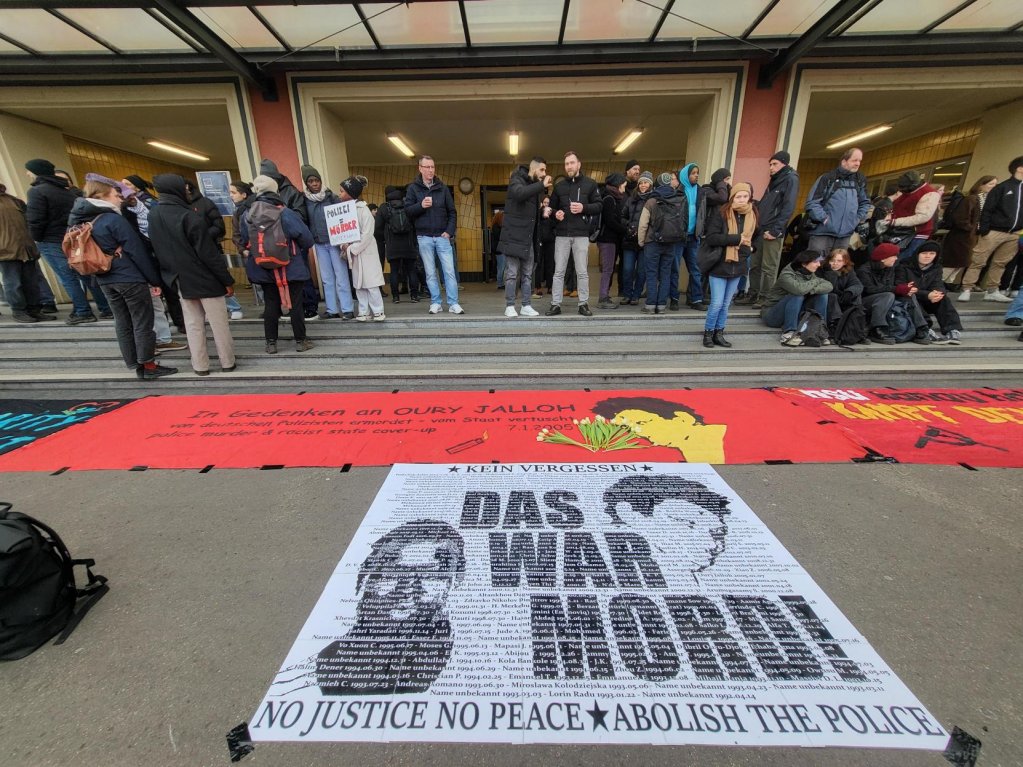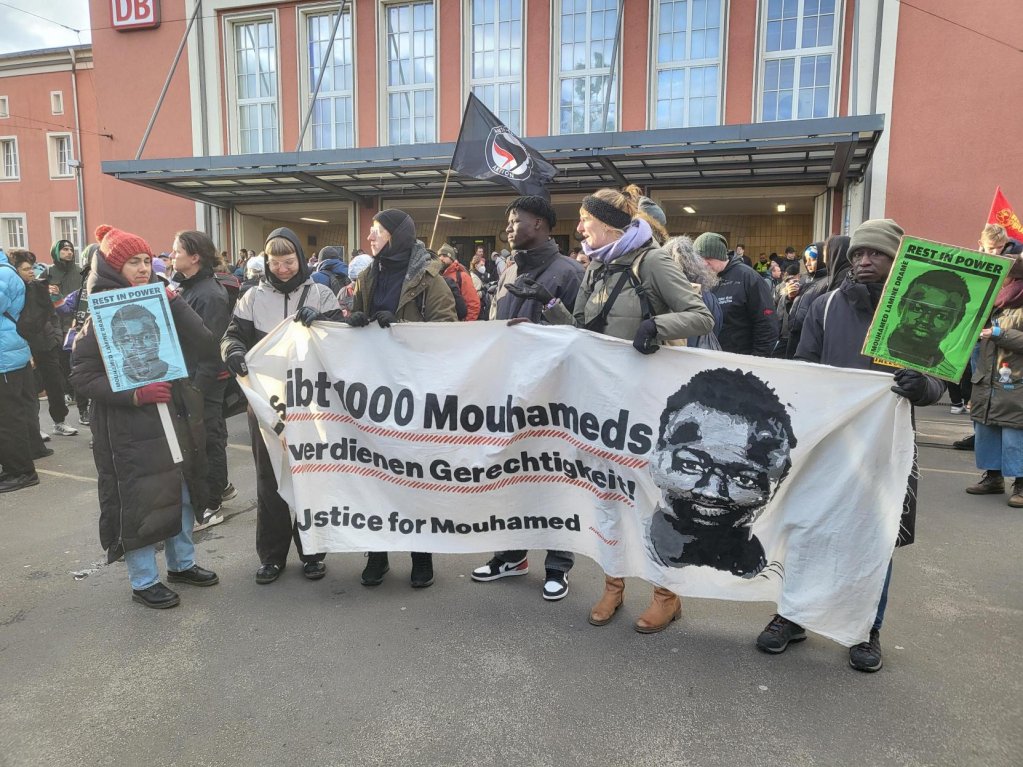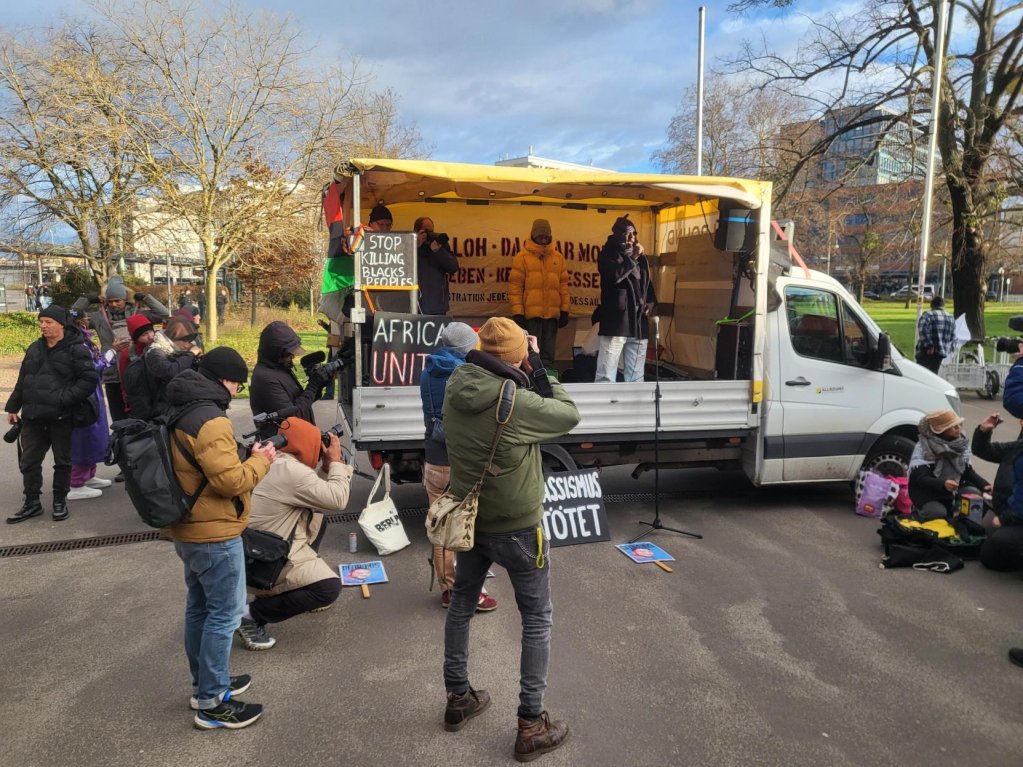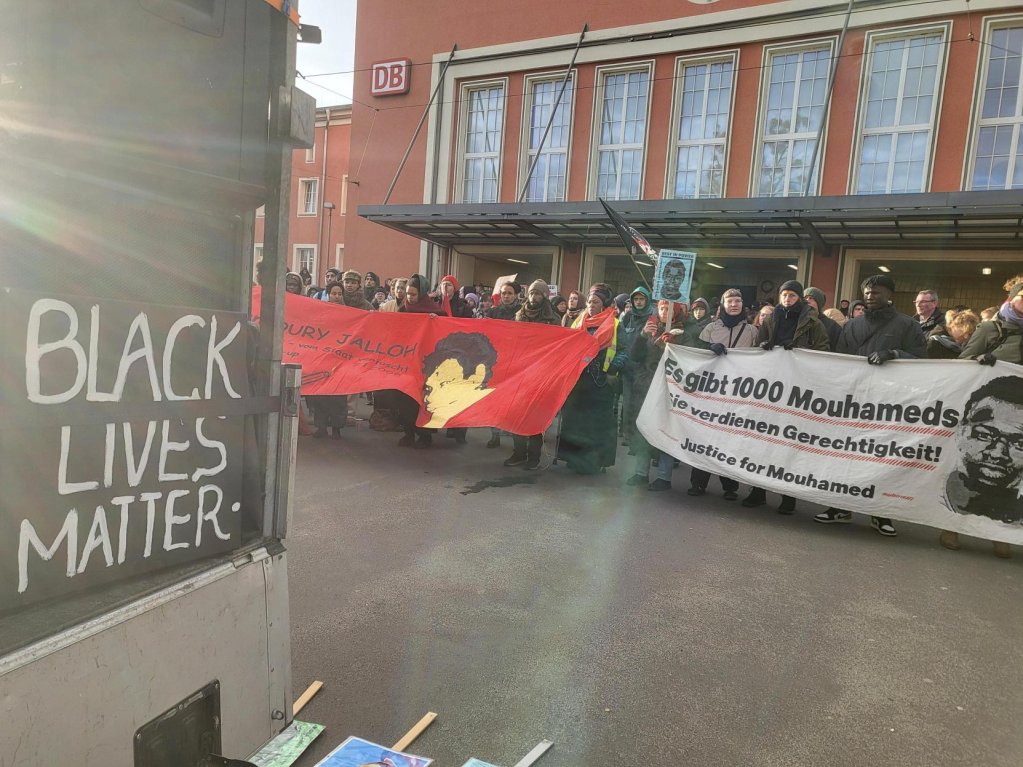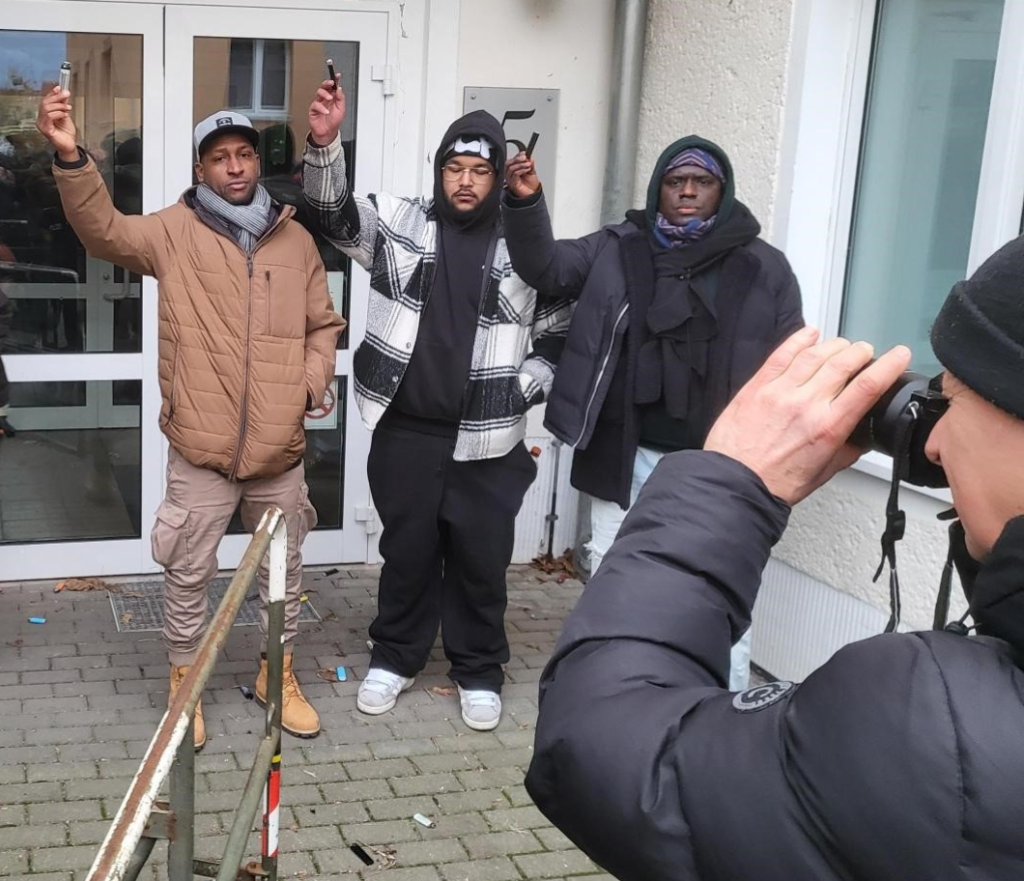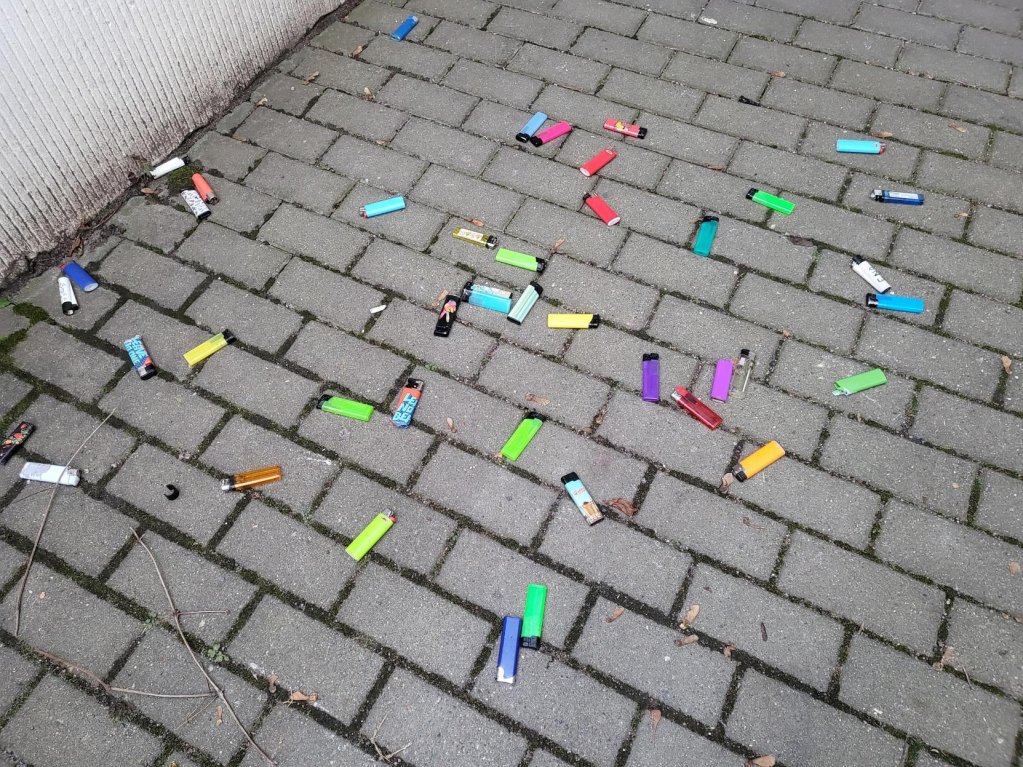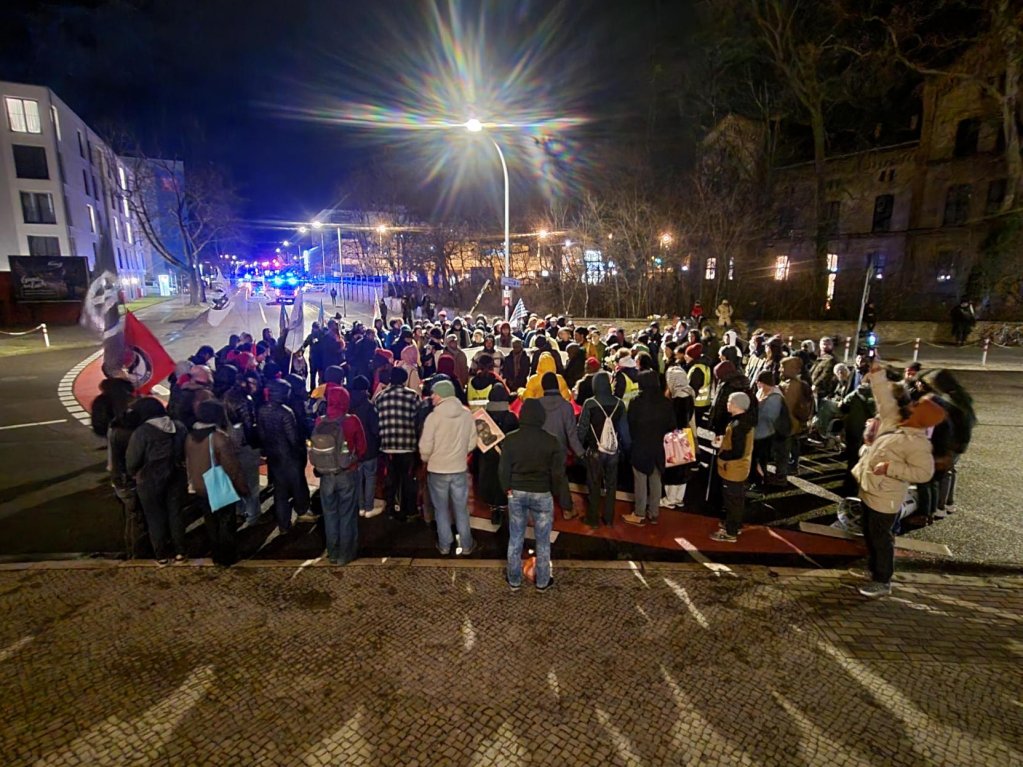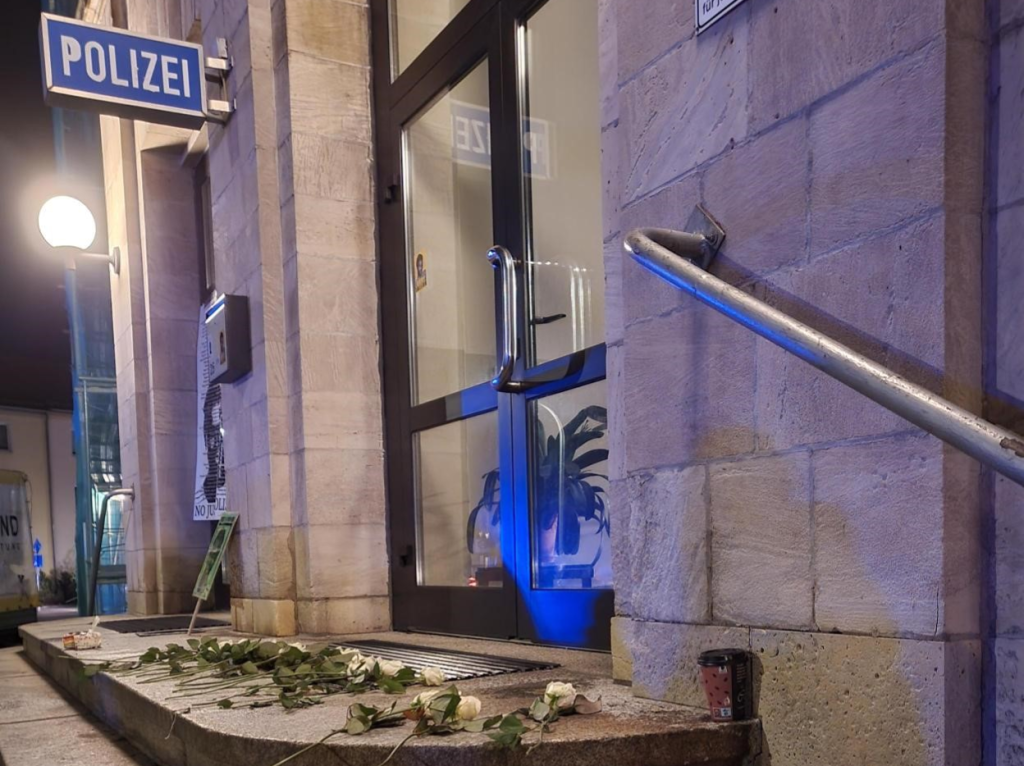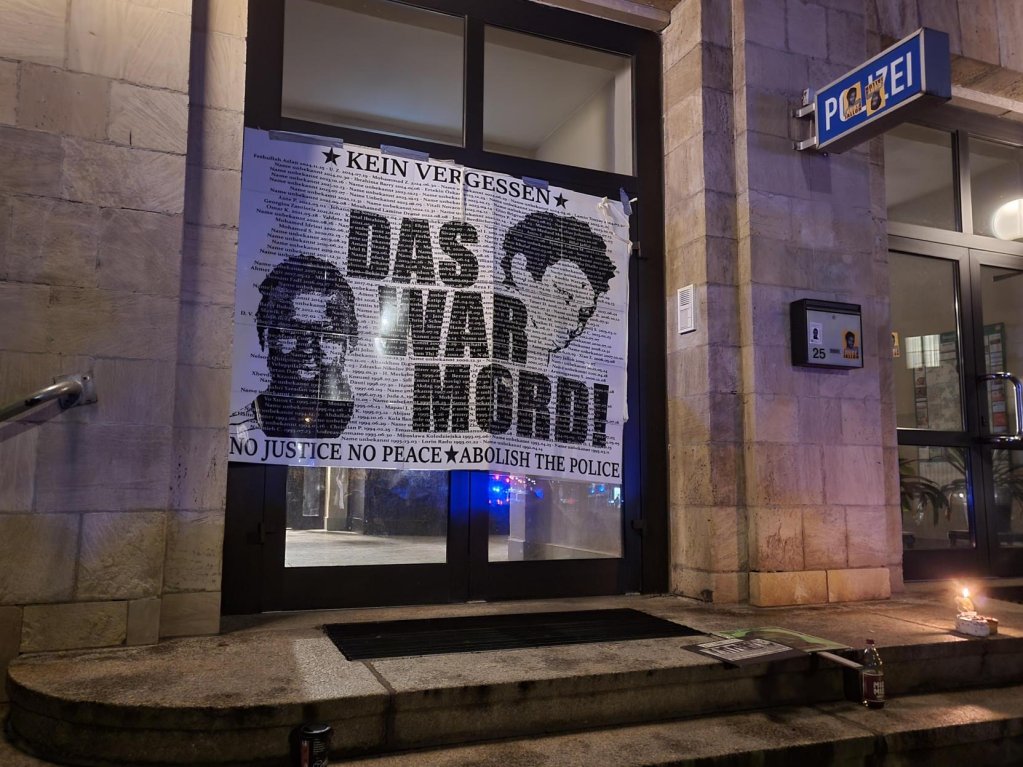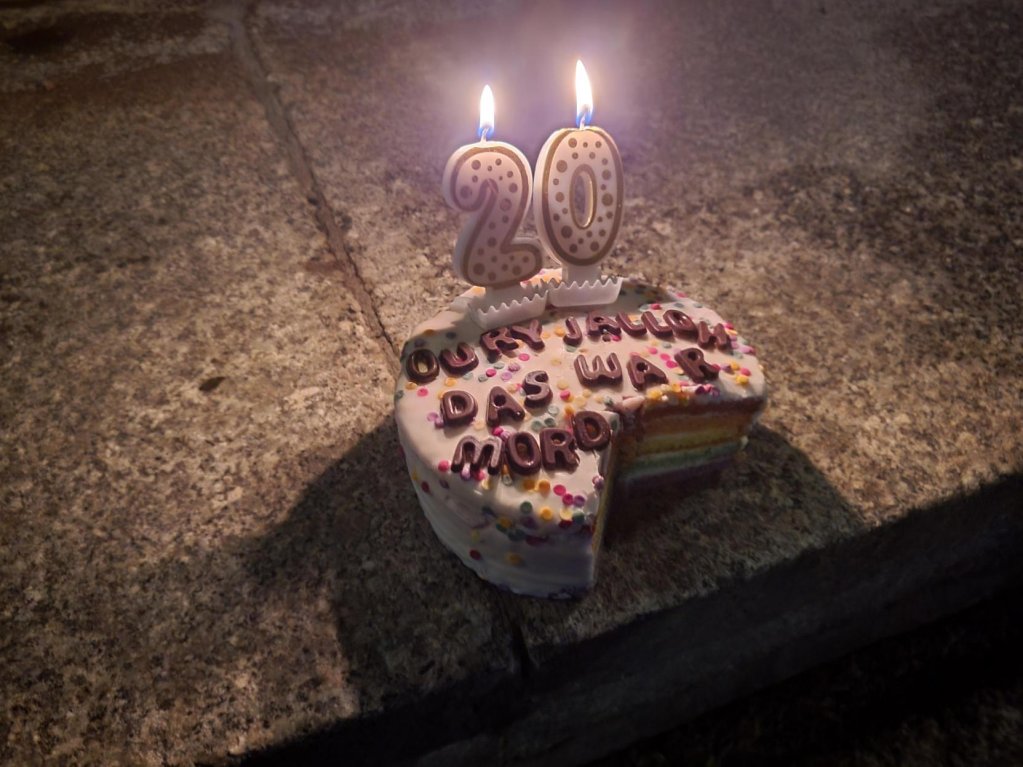On January 7, 2005, Oury Jalloh, an asylum seeker from Sierra Leone, burned to death in a police cell in Dessau, Germany under circumstances that remain unexplained. Evidence suggests he was likely killed and then set alight. At the annual protest march, friends, family and activists commemorated his death and the deaths of the many other people who died in police custody in Germany and elsewhere.
It's a mild winter day in Dessau, a city of 80,000 located a 90-minute train ride southwest of Berlin.
A crowd of around 800 people has gathered at the train station to commemorate and protest the anniversary of one of Germany's most notorious deaths in custody: The presumed killing of Oury Jalloh, an asylum seeker from Sierra Leone who died in a Dessau police cell on January 7, 2005.
The protesters chant "no justice, no peace" and "Oury Jalloh, it was murder", among other slogans. Luisa Meier, who traveled to Dessau from Leipzig, says she joins the protest march every year.
"I believe the remembrance culture, keeping it up, is very important. The case is still unsolved, so I think it's important to keep doing it. There are also other cases like Mouhamed Dramé, who was killed by police. So it's a systemic problem -- police are a problem for people of color."
Dramé, two of whose relatives also joined the march, was a young Senegalese asylum seeker whose death made headlines across Germany since he died in August 2022. Last month, a German court found five police officers not guilty in the deadly shooting.
'We just have to keep going'
One of the organizers of the march is Mouctar Bah. He was one of Jalloh's closest friends and has been the driving force behind the Initiative in Remembrance of Oury Jalloh since the very beginning.
"Seeing so many people makes me happy," says Bah. "Last year we were over 1,700, the year before last the turnout was 3,000. We just have to keep going."
With heavily armed police leading the march, the crowd reaches its first stop: Dessau's Office of the Public Prosecutor. In what has become a custom over the years, people throw dozens of lighters toward the main entrance to protest a long list of inconsistencies, negligence and serious errors in how police and investigating authorities handled the case.
Lighters in particular have enraged survivors and many others: Soon after Jalloh died, a public prosecutor asserted Jalloh had ripped up the faux-leather covering of the fireproof mattress and set fire to the foam himself using a lighter – even though Jalloh had been shackled hand-and-foot to the bed and no lighter had initially been found.
Later, a lighter turned up listed in an evidence inventory -- proof, the Oury Jalloh initiative argued, of police manipulation.
Only one conviction
By the time the procession reaches Dessau's district court, twilight and a drizzle have set in. Activists slab small stickers with Jalloh's now iconic image on the court's entrance.
"I was in this court for two years and followed the trial," says Bah. "I was there every day. It was a farce. They neither wanted to talk about the lighter, nor about DNA, nor that Oury couldn't set himself on fire. This district court is a symbol for me, for the mistrust I have developed. I don't trust this country, I don't trust this democracy."
At the end of the trial, the two police officers on duty were acquitted as the court was unable to solve the death "despite the most intensive efforts".
To this day, the only person to have been convicted in the Jalloh case was the head of the police squad responsible -- to a 10,800 euro fine for involuntary manslaughter. However, the verdict assumed that Jalloh set fire to his mattress himself.
Uptick in right-wing violence
The next stop, the city park, is the scene of another brutal death of an African in Dessau: On June 10, 2000, Mozambican Alberto Adriano was attacked and killed by three neo-Nazis.
The years after Germany's reunification were characterized by right-wing violence, particularly in East Germany, that peaked with attacks on people with a migration history in Rostock-Lichtenhagen, Mölln and Solingen.
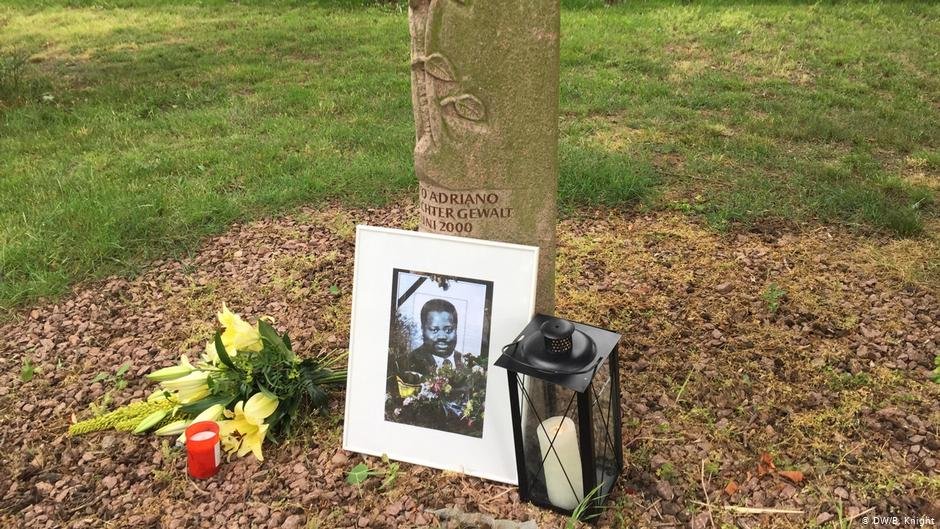
Since Jalloh's death in 2005, the number of reported criminal offenses motivated by right-wing motives in Germany has more than doubled -- to an unprecedented 40,000 last year (through November 31). The real figure is thought to be much higher, and refugees and people with a migration history are reportedly particularly at risk.
Deaths in custody
The first to deliver a speech in the city park is a cousin of Rooble Warsame, a Somali asylum seeker who died in a police cell like Jalloh.
"This is not just a memorial; it's a call to action, it's a demand for justice and a stand against institutional racism and fascism that's plaguing police in Germany and across the West," she tells the crowd. "We also remember the many Black and people of color whose lives were stolen by the very systems that were meant to protect them -- lives like the one of my cousin Rooble who died and was murdered in police custody six years ago in Schweinfurt. To this day, the answers we've received from police fail to address the glaring inconsistencies and injuries to his body."
The public prosecutor's office assumed suicide and closed the investigation in October 2019, but relatives and human rights organizations have had doubts ever since. Now, Sagal, who came all the way from London to join the protest march, plans to launch their own investigation and bring the case to court again with support from legal experts and two organizations.
"We just re-launched the campaign 'Justice for Rooble Warsame'. I'm here to show my solidarity, but also to raise awareness about Rooble's case, as well as speaking about the numbers of refugees and asylum seekers who died at the hands of police custody," she says. "Hundreds of deaths in custody haven't been investigated, a lot of the evidence is conflicting, there's not been any closure for the victims of the families, they've been swept under the rug. There needs to be accountability and transparency for there to be a society that's functioning and can trust the police and the state again."
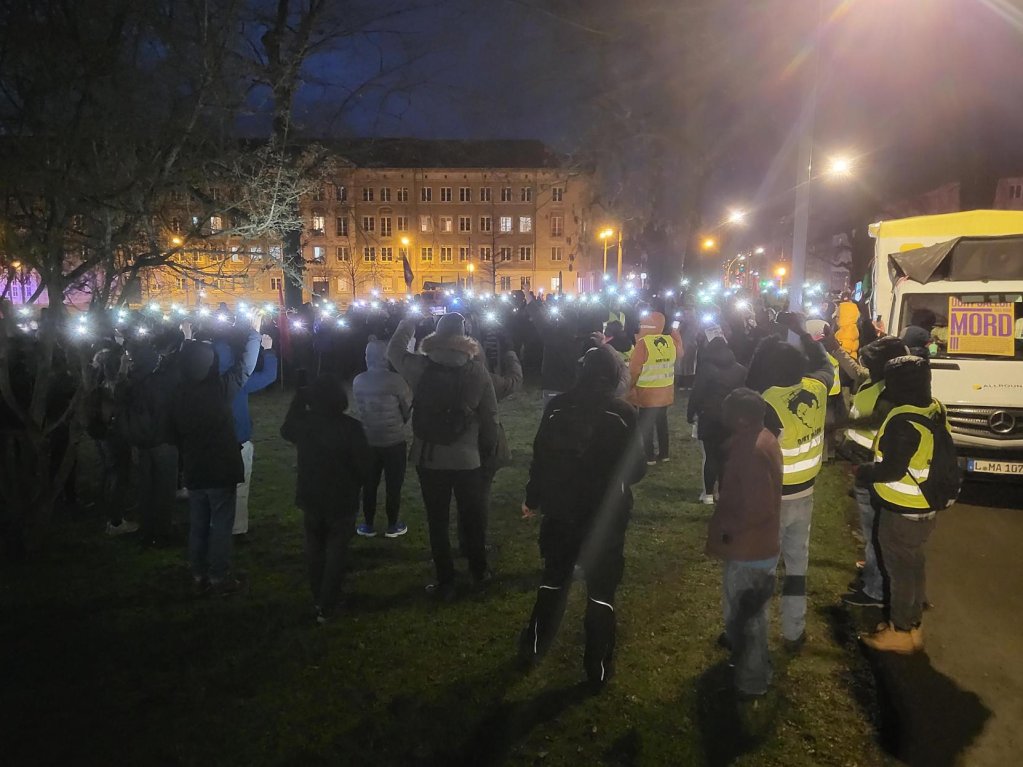
According to the Death in Custody Campaign, more than 260 Black people, people of color, and people affected by racism have died while held in detention or as a result of encounters with German police since 1990. That's almost one death per month. The figures in France and the UK are believed to be even higher.
To Sagal, a key to restore the trust is for police to stop investigating itself, as she says happens all too often with cases of death of custody.
"Police getting away with impunity is dangerous for everyone, because when police are above the law, they can indiscriminately do whatever they want -- including allegedly killing people."
'They must have killed him'
The last but one stop of the protest march is Dessau's towering city hall, which to Mouctar Bah has become a symbol of authorities' failure to provide assistance to him and Jalloh's relatives.
"We tried to talk to the mayor because we didn't get any information from the police," Bah recalls. "But he sent us home. Oury wasn't behaving so well. We thought 'Is this man crazy? Someone is dead in a cell and he says something like that?' But we're still here to show them that we haven't given up, even throughout the investigation we commissioned, which proved that Oury Jalloh was murdered: He had no carbon monoxide in his blood, no stress hormones in his urine. That means they must have killed him beforehand and then poured gasoline over him."
Two reconstructions of the fire in cell number 5 commissioned by the Initiative in Remembrance of Oury Jalloh, one in the mid-2010s and one in 2022, both came to the conclusion that accelerants must have been used.
What's more, a forensic scientist also commissioned by the Initiative found in 2019 that Jalloh had in fact had a broken rib as well as a fractured septum and skull when he died.
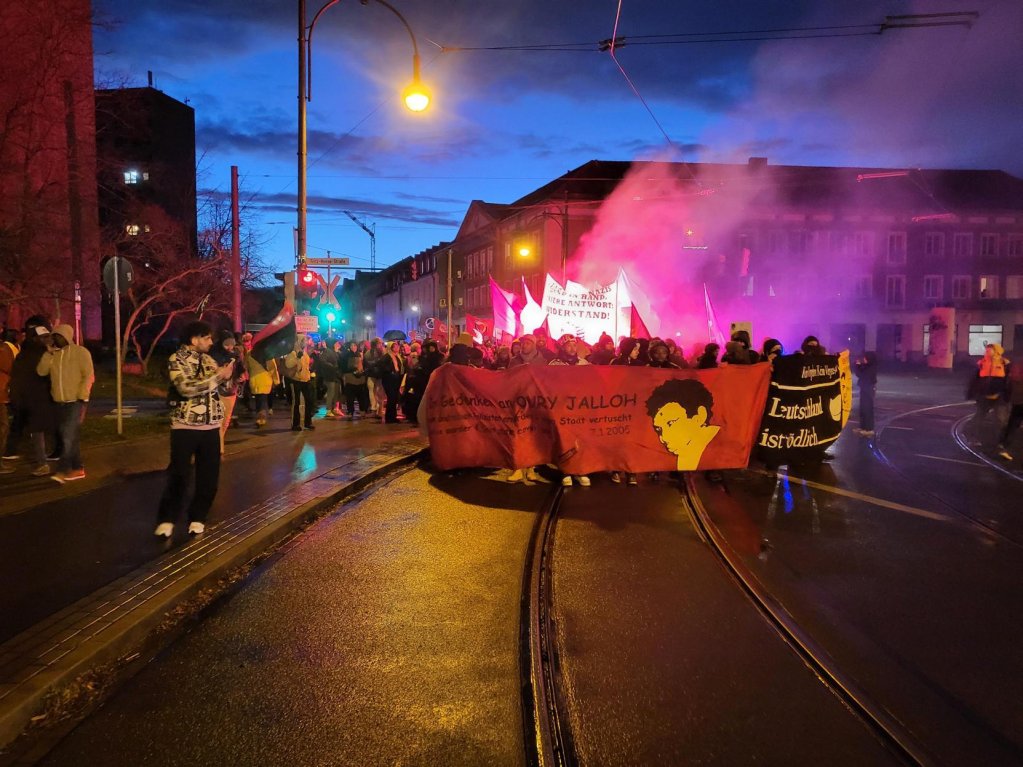
Shattered dreams
Four hours after it started, the thinned-out protest march reaches its destination: The police station where Oury Jalloh spent the final hours of his life. It's where the two officers suspected of abusing and killing him brought him to after four women reported an intoxicated Jalloh to the police for allegedly molesting them.
Felix, Jalloh's only son, is standing only a few meters away from the very cell in which his father burned to death almost exactly 20 years ago.
The now 21-year-old was born around two years before Jalloh died, but he only saw his father once before Jalloh and his German girlfriend gave him up for adoption, reportedly under pressure from authorities and the girlfriend's family.
It wasn't until 11 years ago that the family that adopted him revealed to him what had happened to his father. Today is the first time he returned to Dessau since he was adopted.
"Every time I thought about Dessau, I got petrified," Felix says. "That's the reason I never came. On the one hand, it makes me happy to see so many people fighting for justice; on the other hand, I am kind of depressed; it was my lifetime goal to see my father one day, but on the day in 2014 when I knew what happened, my whole world changed and everything here reminds me of that day. It's like a dance on a knife. This place destroyed all my dreams. I hope that one day we can say: 'Yes, it was a murder'."
After a group prayer with the remaining around 150 people, Jalloh's closest relatives and friends each lay down a flower on the doorsteps of the police station.
A 'nightmare come true'
At least two other people have died in the same Dessau police station under unexplained circumstances. One of them, a homeless person named Mario Bichtemann, also died in cell 5. The two police officers suspected of killing Jalloh were working at the station then, too.
For Mouctar Bah, returning to the alleged crime scene stirs up anger every time.
"The case of Oury Jalloh is a nightmare come true for me. I take to the streets to inform people that something is wrong with this democratic system. If I can no longer believe in justice, at least I believe in the people who take to the streets."
Had the Initiative in Remembrance of Oury Jalloh not been campaigning and fighting for justice by commissioning new expert reports and instigating legal proceedings, the case -- and the truth -- would likely have been filed away long ago.
In 2023, Germany's highest court rejected a constitutional complaint by Jalloh's brother Saliou Diallo, ruling that the suspension of further investigations into the death, which occurred in the eastern German city of Dessau, did not violate Germany's constitution. Diallo wanted to take the case to the European Court for Human Rights; as it has now become known, however, the complaint he submitted later that year did not arrive in due time.
But Mouctar Bah is not giving up: At present, he's preparing to sue Germany at the European Court of Justice with help from public prosecutors in Sierra Leone, Mali or Guinea, Bah's home country.
In Germany, there is no statute of limitations on murder.

